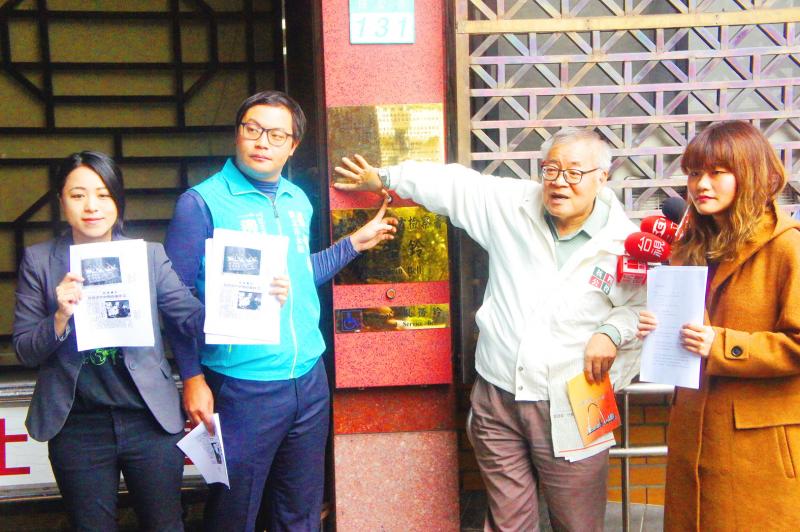China on Wednesday arrested Taiwanese National Party vice chairman Yang Chih-yuan (楊智淵) for alleged involvement in “Taiwan separatist activities.”
Yang traveled to China on Jan. 9, and had not been heard from or seen until he was shown on state media yesterday being escorted by police officers.
Commenting on the arrest, China’s Taiwan Affairs Office spokesman Ma Xiaoguang (馬曉光) told a news conference that “die-hard Taiwanese separatists cannot escape severe punishment under national law.”

Photo: Chien Li-chung, Taipei Times
The Mainland Affairs Council said government agencies had not yet been contacted by Yang’s family to appeal for assistance.
A China Central Television report on the arrest said Yang had been arrested by officers from the Chinese Ministry of State Security in Wenzhou, Zhejiang Province, who said that Yang had “long been engaged in separatist activities aimed at Taiwan’s independence and is suspected of endangering national security.”
The report accused Yang of being involved in the establishment of an “illegal organization,” referring to the Taiwanese National Party, “with the goal of pushing for Taiwan to become a sovereign, independent nation, with the eventual aim of it joining the UN, among other separatist crimes.”
Chinese intelligence agencies had been familiar with Yang for a long time, as he was previously a member of the Taiwan Action Party Alliance — a pro-independence party founded by former president Chen Shui-bian (陳水扁) that dissolved in 2020, a source said.
His arrest was likely meant to pressure Taiwan in the wake of US House of Representatives Speaker Nancy Pelosi’s visit to the country, the source added.
Yang was also involved in the 2008 Wild Strawberries movement and the 2013 “Fury” rally against then-president Ma Ying-jeou (馬英九), the source said, adding that he previously assisted a Chinese dissident seeking asylum in Taiwan.
However, Yang had also been friendly with the pan-blue camp and was even courted by the China Unification Promotion Party to run for it in a local election, the source said.
The Democratic Progressive Party (DPP) yesterday said in a statement that it “strongly condemned China’s lack of respect for human rights and the rule of law, and its use of free Taiwanese citizens as a tool for political blackmail.”
The arrest contravened the terms of the Cross-Strait Joint Crime-Fighting and Judicial Mutual Assistance Agreement (海峽兩岸共同打擊犯罪及司法互助協議), as Chinese authorities did not notify the government or Yang’s family of the arrest, the DPP said, citing a Mainland Affairs Council news release.
Executive Yuan spokesman Lo Ping-cheng (羅秉成) told a news conference that the Ministry of Justice had not been given details about the arrest, adding that the government would follow the case’s development.
Lo said the government urged China to respect personal freedoms including free speech, and to refrain from indiscriminate arrests and abuse of power, which affect the rights and interests of Taiwanese in China.
Additional reporting by Chen Yun and Lee Hsin-fang

MORE VISITORS: The Tourism Administration said that it is seeing positive prospects in its efforts to expand the tourism market in North America and Europe Taiwan has been ranked as the cheapest place in the world to travel to this year, based on a list recommended by NerdWallet. The San Francisco-based personal finance company said that Taiwan topped the list of 16 nations it chose for budget travelers because US tourists do not need visas and travelers can easily have a good meal for less than US$10. A bus ride in Taipei costs just under US$0.50, while subway rides start at US$0.60, the firm said, adding that public transportation in Taiwan is easy to navigate. The firm also called Taiwan a “food lover’s paradise,” citing inexpensive breakfast stalls

TRADE: A mandatory declaration of origin for manufactured goods bound for the US is to take effect on May 7 to block China from exploiting Taiwan’s trade channels All products manufactured in Taiwan and exported to the US must include a signed declaration of origin starting on May 7, the Bureau of Foreign Trade announced yesterday. US President Donald Trump on April 2 imposed a 32 percent tariff on imports from Taiwan, but one week later announced a 90-day pause on its implementation. However, a universal 10 percent tariff was immediately applied to most imports from around the world. On April 12, the Trump administration further exempted computers, smartphones and semiconductors from the new tariffs. In response, President William Lai’s (賴清德) administration has introduced a series of countermeasures to support affected

CROSS-STRAIT: The vast majority of Taiwanese support maintaining the ‘status quo,’ while concern is rising about Beijing’s influence operations More than eight out of 10 Taiwanese reject Beijing’s “one country, two systems” framework for cross-strait relations, according to a survey released by the Mainland Affairs Council (MAC) on Thursday. The MAC’s latest quarterly survey found that 84.4 percent of respondents opposed Beijing’s “one country, two systems” formula for handling cross-strait relations — a figure consistent with past polling. Over the past three years, opposition to the framework has remained high, ranging from a low of 83.6 percent in April 2023 to a peak of 89.6 percent in April last year. In the most recent poll, 82.5 percent also rejected China’s

PLUGGING HOLES: The amendments would bring the legislation in line with systems found in other countries such as Japan and the US, Legislator Chen Kuan-ting said Democratic Progressive Party (DPP) Legislator Chen Kuan-ting (陳冠廷) has proposed amending national security legislation amid a spate of espionage cases. Potential gaps in security vetting procedures for personnel with access to sensitive information prompted him to propose the amendments, which would introduce changes to Article 14 of the Classified National Security Information Protection Act (國家機密保護法), Chen said yesterday. The proposal, which aims to enhance interagency vetting procedures and reduce the risk of classified information leaks, would establish a comprehensive security clearance system in Taiwan, he said. The amendment would require character and loyalty checks for civil servants and intelligence personnel prior to